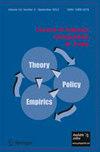数字音乐播放器市场的竞争性
IF 0.6
Q4 BUSINESS
引用次数: 0
摘要
我们测试了数字音乐播放器市场的可竞争性概念。该理论认为,新进入者的威胁使企业的市场力量受到制约。但Baumol和其他人认为,纯粹可竞争的市场在现实中很少发生。便携式音乐播放器市场一直由一家生产商主导。我们估计了2002年至2010年经质量调整的价格指数。结果显示,市场价格平均每年下降约20%,这与其他IT产品类似。这为市场具有相当可竞争性的观点提供了支持。本文章由计算机程序翻译,如有差异,请以英文原文为准。
Contestability in the Digital Music Player Market
We test the concept of contestability in the digital music player market. The theory suggests that the threat of new entrants keeps firms’ market power in check. But Baumol and others argue that pure contestable markets rarely happen in reality. The portable music player market has been dominated by one producer. We estimate a quality-adjusted price index from 2002 to 2010. Results show that market prices decline at an average rate of about 20 percent per year, which is similar to other IT products. This provides support for the idea that the market is fairly contestable.
求助全文
通过发布文献求助,成功后即可免费获取论文全文。
去求助
来源期刊

Journal of Industry Competition & Trade
BUSINESS-
CiteScore
3.10
自引率
5.30%
发文量
15
期刊介绍:
The Journal of Industry, Competition and Trade (JICT) publishes research on the microeconomic foundations of industrial strategy, innovation, competition, and trade policy, concentrating on the functioning of markets for goods and services. The journal’s primary aim is to bridge the gaps between economic theory, empirical analysis and economic policy, and to provide a forum for applied theoretical research on policy questions. Journal of Industry, Competition and Trade promotes the combination of theories with facts, and encourages the incorporation of facts into model building. focuses on using applied theoretical research to arrive at policy conclusions, and encourages researchers to investigate policy questions. For example, game theoretical models that analyse the sources of and obstacles to innovation, the functioning of markets or strategic interactions are combined with empirical facts; and supporting empirical analysis is provided for models that explain how institutions, consumers and firms interact, how they shape their environment, and how incentives influence behaviour. Papers that analyse institutions and policy measures are expected to make explicit reference to theoretical models, while theoretical work is expected to include the analysis of empirical implications. The journal serves as a forum for dialogue between economists from academia and (national or international) policy circles. The composition of the Editorial Board, which includes academics as well as leading economists working at governmental and international organizations, facilitates exchanges between academia and economic policy. Officially cited as: J Ind Compet Trade
 求助内容:
求助内容: 应助结果提醒方式:
应助结果提醒方式:


